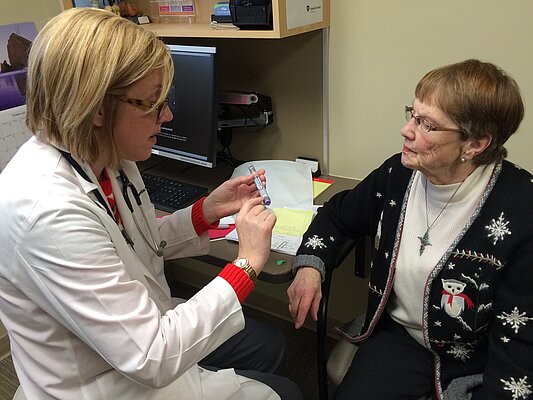North Dakota Pharmacists Service Enhancement Project

Principal Investigator: Brody Maack, PharmD, BCACP, CTTS
Timeline: 2021-2023
Funding: $15,168 (ND Pharmacy Services Corps); $20,000 (ND Department of Health)
Collaborators: Natasha Petry (Co-PI, Pharmacy Practice), Allison Hursman (Co-PI, Pharmacy Practice), Mary Ann Kliethermes (Consultant, American Society of Health-System Pharmacists), Todd Sorensen (Consultant, University of MN College of Pharmacy), ND Department of Health, ND Society of Health-System Pharmacists (NDSHP), Ambulatory Reimbursement and Innovation Enhancement Group (ARIES)
Purpose: To enhance and expand pharmacist cognitive/clinical services provided in ND while ensuring sustainability through billing and reimbursement of services.
Objectives:
- Identify the current state of clinical service provision and billing practices among ND pharmacists.
- Create a comprehensive list of all available and reimbursable pharmacist services in ND.
- Create a process of identifying/tracking utilization of reimbursable services.
- Identify gaps and barriers to pharmacist service provision.
- Design an education program that involves baseline training with ongoing academic detailing to facilitate pharmacists to implement clinical services that are reimbursable.
- Implement at least one new billable clinical service at each pilot practice site.
What is already known on this topic?
Across the United States, there are a wide variety of clinical services that pharmacists can provide in the outpatient setting. Evidence has shown that pharmacists provision of these services result in improved patient biomarkers and outcomes (such as improved blood pressure and/or diabetes control). There are many services that pharmacists are allowed to bill and be reimbursed for, in order to help sustain the programs. However, due to limitations related to pharmacists’ ability to bill as a medical provider, billing practices have limited the up-scaling and broad implementation of clinical services, despite evidence demonstrating strong return-on-investment to third party payers. In North Dakota, the current state of pharmacist clinical service provision is relatively unknown. Furthermore, the extent to which pharmacists are currently providing billable clinical services in ND is also unknown.
What is the potential impact of this project on collaboration and advancement in pharmacy?
The independently owned nature of community pharmacies in North Dakota presents many unique opportunities for pharmacists and the patients they serve. Pharmacists have been able to develop their own clinical services to provide, tailored to the patient populations who frequent their pharmacies. There is opportunity to expand upon these services, particularly in light of the evolving difficulty with revenue generation through traditional dispensing activities. Busy pharmacists may not have the bandwidth to plan, design, implement and sustain a billable service without guidance. Therefore, by identifying available reimbursable clinical service opportunities for pharmacists, along with providing education and ongoing training to optimize the sustainability of new services, there is potential to expand many services provided by pharmacists across North Dakota.
What is the potential impact of this project on improving population health?
Many North Dakota citizens live multiple miles from their nearest clinic or hospital facility, given the rural nature of the state. However, they may live relatively close to their local pharmacy or pharmacist. By enhancing the ability of pharmacists to provide direct clinical care to patients that is reimbursable and thus sustainable, there is potential to increase access to high quality health care for patients, leading to improved health and humanistic outcomes.
What ways will the results of this work be disseminated?
Through research, the results of this project will be disseminated via conference presentations (i.e. poster and podium presentations) and journal publications. The project will begin as a pilot, and if successful, efforts will be made to expand to all ND pharmacists providing care in the outpatient setting. Additional grant funding will be sought to support that up-scaling.


